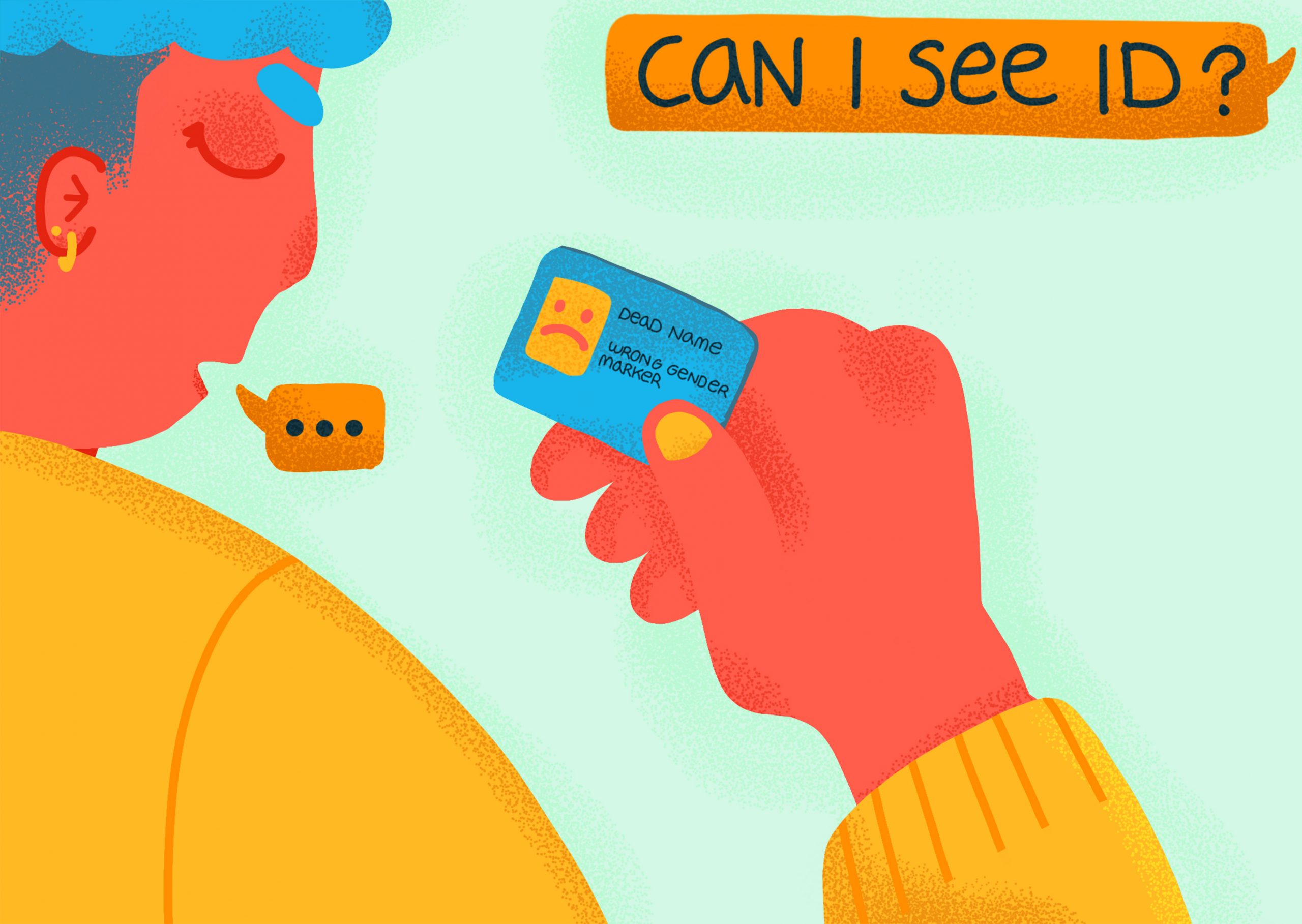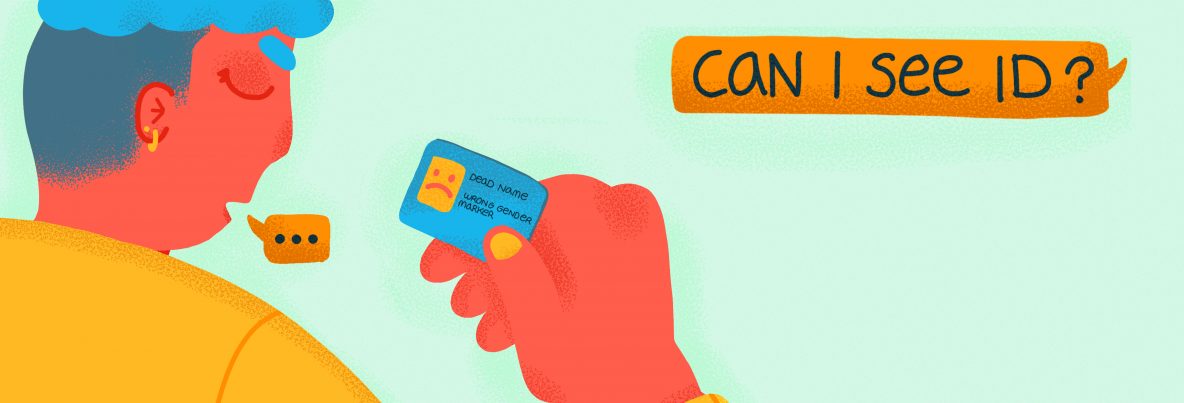Transgender Rights
Trans rights have always been under threat, however 2020 has seen an increase in discussion around the rights of transgender people. Today Lauren McLoughlin explores why...
By Lauren McLoughlin / 13 July 2020

Illustration by Finn Weaver
In recent weeks, pro-trans activism has swept through the western world with vigour. Incited by a surge of attacks on citizens of marginalised communities - George Floyd, Breonna Taylor, Ahmaud Arbery, Dominique Fells, Riah Milton, Tony McDade - and magnified by a racist, transphobic pandemic that has laid bare the hierarchies of our society. The visibility and resolve of our trans communities is greater than ever.
Yet, across the world the rights of transgender individuals continue to be denied and even revoked.
In the UK, proposed amendments to the 2004 Gender Recognition Act, which would simplify the process of legally changing one’s gender, have reportedly been scrapped by the Johnson government. The existing system requires trans people to navigate a heavily bureaucratic, costly and degrading system in order to have their identity recognised legally. Not only is the decision made by an anonymous panel whom the applicant does not meet, they also are unable to appeal the decision once it has been made. Let’s not forget that a medical diagnosis of gender dysphoria must be provided - seems a little archaic, doesn’t it?
With the reversal of these amendments, the UK government is denying its citizens the ability to navigate and create their own identity. A result that reflects a general lack of understanding of trans identities and experiences, and speaks to the success of anti-trans lobbying efforts. Unsurprisingly, then, Johnson is also set to introduce greater “safeguarding” laws for female-only spaces that exclude trans women, in response to the campaigns of groups such as Fair Play For Women, who have found more purpose rallying around toilets than standing with their fellow victims of patriarchal oppression.
As Simona Castricum has eloquently written: “The “trans bathroom panic” phenomenon remains a distraction – not only from our right to piss without prejudice – but from much larger issues worthy of discussion”.
Similarly, across the pond the US government is enacting major reductions and even reversals to trans rights.
In the last 3 years, the Trump administration has orchestrated the expulsion of transgender soldiers from the military (a policy update that Trump graciously announced via Twitter); prohibited transgender children from participating in school sports competitions; permitted religious schools to ignore non-discrimination standards; fired the White House Presidential Advisory Council on HIV/AIDS (conditions that disproportionately affects the LGBTQ+ community); banned transgender students from using bathrooms and locker rooms that align with their gender identity; the list goes on and on and on.
In the last few weeks, Trump has announced the withdrawal of the 2010 Health Care Rights Law, which prohibits “discrimination based on race, colour, national origin, sex, age or disability”. In the midst of a pandemic that is disproportionately affecting trans people, and further, trans people of colour, the US government has stripped its most vulnerable citizens of what little protection they had against discrimination in healthcare. The lack of value that the US government places on trans lives is shockingly blatant.
The glaring transphobia of these measures is a laughably far cry from the sentiments of Trump in his presidential candidacy days. Where is the president who claimed he would “do everything in his power” to protect America’s LGBTQ citizens? The president whom Caitlin Jenner endorsed on “I Am Cait” because she firmly believed Trump would stand for LGBTQ+ rights more than any other contender?
With regressive leaders motivated by irrational fear and ignorance, the western world remains a dangerous place to be trans. Already this year 12 trans or gender nonconforming individuals have been murdered in the US, with a staggering 331 killed globally in 2019. As these numbers include only documented attacks, it is likely that the real figures are significantly higher. The majority of victims were trans women of colour.
The murders themselves are distinctly violent and sadistic, and indicate how deeply and aggressively transphobia has pervaded the modern world.
Dominique Fells was found dismembered in the Schuylkill River just last month in Alabama; Layla Peláez and Serena Angelique Velázquez were covered in gasoline and burned to death in a car in Puerto Rico; Hande Kader was raped, murdered, and burned in Istanbul. The global prevalence of brutality inflicted on trans people and their bodies is unparalleled, there is no country or regime in which they are protected, there is no place where they are socially, economically or politically equal.
Anti-trans protests and lobbying groups have sadly dominated the debate on trans rights, peddling the notion that trans women pose a threat to cis-women and their spaces. In doing so, they suggest that trans women are not actually women at all, but men. This is a double-edged sword as the male spaces they are then relegated to, contrary to their gender identity, are the spaces in which they are the most vulnerable to violence. These assumptions; that trans women are not women and that they pose a threat to cis women, is propagated and reinforced by western popular culture. Male actors have repeatedly been cast to play trans women, rather than trans women (Eddie Redmayne in The Danish Girl, for instance), whilst their most commonly shown profession in film and tv is prostitution or sex work.
The pitting of cis-women and trans women against one another is one of the most upsetting, unproductive and damaging downfalls of the current fight for trans equality. Anti-trans rhetoric cannot be advertised under the banner of feminism, and feminism cannot exclude its trans and non-binary comrades from the fight for equality.
Whilst the growing popularity of a number of transgender celebrities and activists - Laverne Cox, Caitlin Jenner, Carmen Carrera - have helped to introduce positive and realistic representations of transgender people into mainstream media, the platforming of these still-too-few individuals is yet to bring about systemic change for the vast majority of trans people.
The trans community is now more visible, more determined and more resilient than ever, but the fight for equality cannot be executed by them alone. We must educate and mobilise ourselves and those close to us and stand in solidarity with our trans / non-binary / LGBTQ+ communities. We must reject harmful and inaccurate stereotypes which encourage us to submit to a system built on white, male, heterosexual power. As feminists and racial activists, we must also realise that intersectionality is fundamental to our cause. We will not be not equal until trans people are equal, until all people are equal.
If you are looking to educate yourself further on the trop of trans rights, these are some good resources:
Disclosure, a documentary available on Netflix.
A Life in Trans Activism, a book by A. Revathi as told to Nandini Murali
Whipping Girl: A Transsexual Woman on Sexism and the Scapegoating of Femininity, a collection of essays by Julia Serano
NB, a podcast available on the BBC
One from the Vaults, a podcast available on Soundcloud
@tanyacompas on Instagram
@munroebergdorf on Instagram
@hellomynameiswednesday on Instagram
@melzdot on Instagram
@kennyethanjones on Instagram
@voices4ldn on Instagram
(Thank you to the lovely Nic Mitchell for recommending so many of these to me)
Art by
Words by
Share this article

